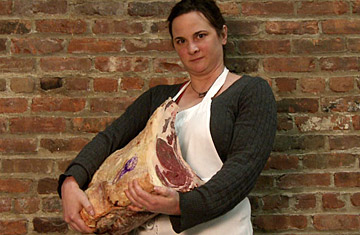
Julie Powell, author of Cleaving: A Story of Marriage, Meat, and Obsession
Writer Julie Powell's debut book Julie & Julia endeared her to aspiring cooks everywhere. The project started as a blog — chronicling the year she spent cooking all 524 recipes from Julia Child's classic Mastering the Art of French Cooking — and grew into a hit movie starring Amy Adams and Meryl Streep. By the summer of 2008, Powell was firmly ensconced in a new career as a successful writer and celebrity foodie. But Powell's offscreen life didn't follow the script. With her marriage falling apart, she took a sabbatical from her New York City home to learn the advanced skills and techniques of cutting meat. The result is her second book, Cleaving: A Story of Marriage, Meat, and Obsession. Powell talked to TIME about the delicate art of butchery during crisis.
What led you from delicate French cuisine to meat?
I have been fascinated by butchers ever since I moved to New York. I grew up in Austin, Texas, and we didn't have these old-school butcher shops; my meat was wrapped up in cellophane, and that was it. When I moved to New York and discovered these old shops, I was fascinated by the skills these men had — they were born and raised learning how to use these knives. And I so envied that — that deep comfort level they had with their craft.
You started learning butchery at a difficult point in your marriage.
I am the kind of person who, in a period of crisis, tends to make my life crazier than it was already. The Julie & Julia project was all about that — a way for me to bring some structure to my life after I'd freaked out about turning 30. When I come to the point that is depicted in Cleaving, this difficult period in my marriage, I needed something to take my focus physically, mentally. Learning this art of butchery and spending hours at the shop was what I needed to focus on — both to learn the skills and to figure out what I was doing in life.
What surprised you about working with meat?
When I started trying to learn, I thought the way most people do about the butcher — a savage man with a big cleaver. But what I very quickly discovered is that it is actually a much more delicate process and that taking a 150-lb. chuck shoulder and then breaking it down into short ribs and sausage meat is a long set of little steps. I love that 90% of butchering is done with the 1-in. tip of your 5-in. boning knife. There is a road map in every piece of meat you follow, and the muscles will come apart the way they were meant to. That is, for me, a beautiful act.
The title of this book can mean two opposite things — "to cling to," or "to separate."
That's the essential conundrum of the book. Which of these things am I doing? Or am I doing both? It was a period in my marriage where things were very confused and I had done some pretty hateful things. Eric and I married quite young — we had been together since we were 18 — and what happens with marriages that begin that young is that essentially we grew up together. So this moment came when I realized I had changed, and Eric had changed, and the marriage had not, but it needed to desperately.
The cleaving of the title is very analogous to what I was doing on the cutting board — taking apart this thing I thought I understood and looking at the parts and thinking, Do they fit back together? How do they fit back together? Is there some new thing this marriage can become?
How does this act of knowing our food help us?
People have been getting more and more into the provenance of their food, their meat, their produce, their honey, that sense of being responsible for this entire journey your food takes to get to your plate. When Michael Pollan published The Ominvore's Dilemma, that just put into words things that many people have been thinking for decades. It is important for people to really see and understand what they are putting into their bodies, because of the dangers we know about industrial farming, because of the frugality of using entire animals.
Totally aside from any political or social implications, the fact is that grass-pasture-raised meat just tastes better. The pork is porkier; the beef is beefier. The more aware we are of what the implication is of our eating habits, the healthier we are going to be.
